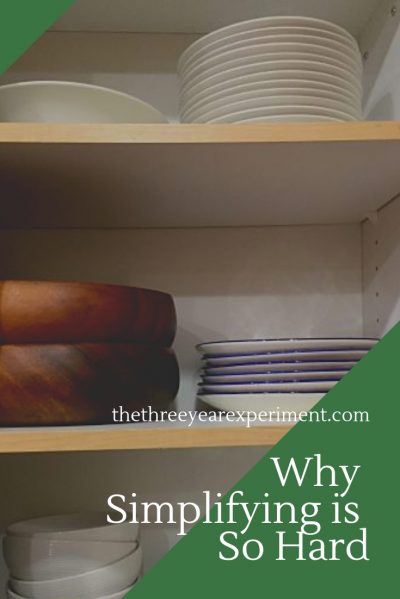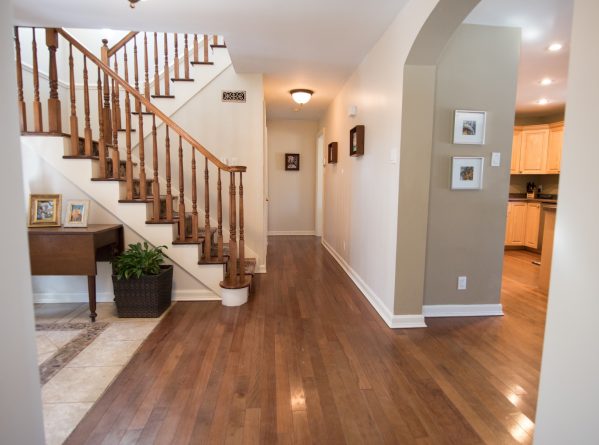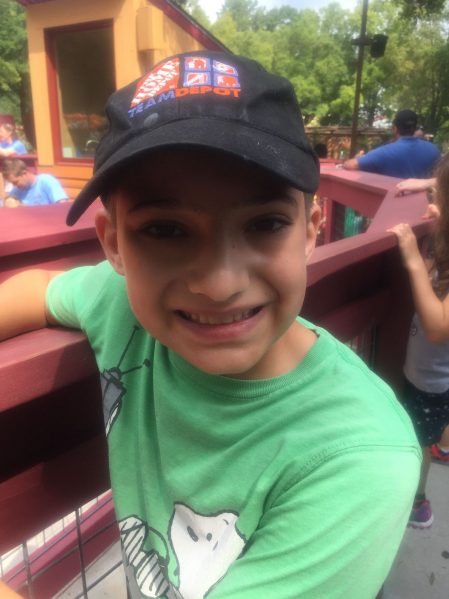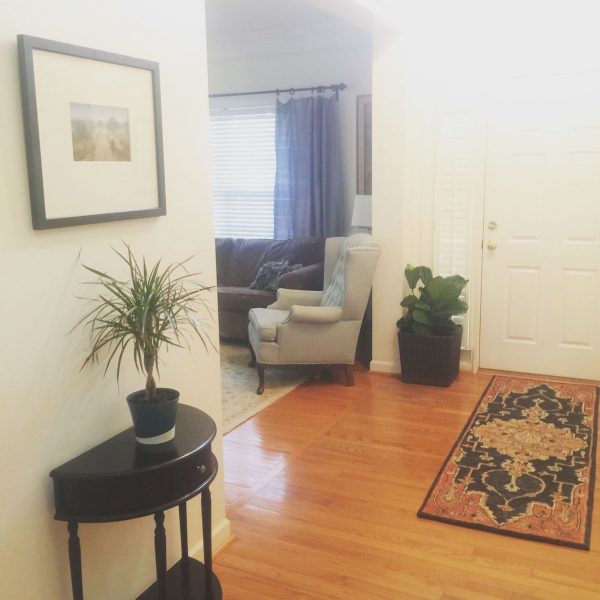Ahh, simplicity. So simple, yet so illusive.
The simplicity paradigm, of course, is that the less we have, do, and schedule, the better off we are. Less really is more.
Nowadays this truism is something like common knowledge. Our lives are inundated with so much stimulation, consumer goods, and social media that we somehow know we’re due for a step back. To borrow Joshua Becker’s quote, “Busy is the new Fine.” When I ask a friend how she’s doing, of course I’m going to hear how crazy busy she is with her kiddos. I might hear, “Fine. Busy!” But that word is usually thrown in somewhere. Badge of honor in our modern world.
I don’t say that to people (more on that below), but I know what she means. Just scrolling through my feed and reading seven articles on different important topics leaves me feeling stuffed. Can you relate?
Back in the ’90s, when I was growing up, and busy was not yet the new fine, I was busy. I share genetics with a father we affectionately call The Renaissance Man. He is always learning something new, going on a trip, picking up a new hobby. I, too, wanted to experience everything.I was a child who wanted to sign up for every after school activity. In high school, I was going to be the editor of the yearbook and the drum major of the band, amongst myriad other activities, until my parents called fowl.
In the ’90s, with cheap plastic goods beginning to flood in from Asia, our homes were filled with stuff. Kids got toys outside of Christmas and birthdays. I had a lot of toys. So many that I would fill my piggy toy chest to overflowing, and still have only started cleaning up my toys. The beginning of our over-consumption and over-scheduled lives didn’t start overnight.

My grandmothers didn’t buy things like I do now. They took infinite amounts of time to make a purchase, researching options, paging through Consumer Reports, taking their time with things.
When I moved to Chile, I was shocked at how people bought consumer goods. Because there was less to buy in Chile (relatively speaking), goods tended to be much more expensive, especially relative to income. If I wanted to buy a pen, for example (and I had to make these purchases all the time, because I moved to the country with nothing more than a suitcase full of clothes), I had to go into the store, talk to the clerk behind the counter, get him or her to fetch me the pen, take the pen to the cashier, pay for the pen, wait for the bagger to hand me my purchase, then show the guard my receipt on the way out.
It took so long to buy everything! And when people made purchases, they did so with care. They took a long time to test different pens and decide which ones they wanted. They brought their mothers so they could have a ten minute conversation on the relative qualities of Pen A over Pen B.
In hindsight, I see now that the ease (almost disregard?) with which we buy, well, everything, makes us much less likely to carefully and reflectively fill our homes.
It is the same with information. Because we have access to so much, we binge read, watch, listen. If we can cram one more article in, we’ll finally learn what we need to know to be satisfied.
And with our schedules, especially for our kids, if signing them up for one activity is good, then signing them up for four must be better. Because the cost of college is so high! And they have to get in the best school! And to do that, don’t we need to make sure they’re well-rounded, can play the violin, and participate in the travel soccer league?
Here’s the problem, though. Even though we KNOW we need less, achieving a life of less in our culture of more can feel like a constant mistake. Because we are constantly seeing ads for products that we need to make our lives complete, entertainment options that promise golden memories for years, and people around us who have opted in, way in, for MORE, choosing simplicity can feel like a mistake.
Here’s a reminder of the benefits of less, and some ways I’ve learned to stay the simplicity course in the face of a society of more:
Space
I first Kon-Maried my house in 2014, after getting my hands on The Life Changing Magic of Tidying Up. Simplifying sparked joy for me, in a major way.
I started with my clothes. I was ruthless. I donated six or seven giant garbage bags worth of clothing. I even convinced Mr. ThreeYear to go through his clothes, not an easy task.
I was left with a closet full of clothes that I liked and wore often. When I started working as a teacher in 2015, I had to buy some more pieces for school, but my wardrobe became very functional. The majority of my clothes were black and navy, with splashes of color thrown in. I had three pairs of boots: black, brown, and tan.
I read Simplicity Parenting and embraced the author’s suggestions to halve the number of toys in the boys’ rooms, then halve them again, then halve what’s left. I reluctantly culled a few books from their shelves as well. They loved the results.
While I never simplified enough to call myself a minimalist, I was comfortable with the title semi-minimalist.
I would look at my house, and feel calm.

Scheduling
Because I’ve always been a person who wants to do it all, simplifying our family’s schedule was a bit more difficult.
The first thing I did was to quit all the committees I was on:
- Vacation Bible School
- Parent Teacher Group
- Upper Valley Leadership Recruiting Committee
- Elder at my church
I read Marie Kondo’s book as I was just going back to work again after seven-and-a-half-years as a stay-at-home-mom, so a lot of the simplification felt necessary for this new stage of my life. I no longer had the free time to dedicate to committees now that I was working, and I wanted to spend the time I wasn’t working with my family.
It was remarkably easy for my to quit the committees. Some of the commitments (like being an elder) were coming to an end, and for others, I simply explained my situation and said I no longer had the time to devote. While it occasionally felt uncomfortable or like I was letting people down, the end result of doing so much less felt incredibly freeing.
Stepping off all of the committees gave me free time. It gave me margins so that I wasn’t always frazzled, in a hurry, and grumpy (I tend to get grumpy when I feel stressed).
Eventually, we made the decision to cut the boys’ activities down to one each.
We made that decision last year but we didn’t do so well. They ended up with one activity per season.
This year, however, they both truly have one activity each.
Despite the fact that such a simple schedule seems to be really beneficial for them, I regularly worry (even now as I type this) that they’re missing out on beneficial lessons from team sports or groups.
Information
We began to notice that Junior ThreeYear was spouting off facts from the show Adam Ruins Everything a couple of months ago. Although it’s a funny show, and purports to uncover the “truth” behind common myths (like “you should drink 8 glasses of water a day”), we realized that Junior ThreeYear didn’t need to watch this show, that it was too much information for his still-developing brain to process effectively. He took every word in the program as gospel, and doesn’t yet have enough insight to realize that even Adam himself has an agenda.

I have put myself on a similar information diet. I read the news infrequently, if at all. I don’t watch the news, almost ever, unless someone turns it on in front of me.
Limiting the amount of outside information we have access to makes it easier to be present in the day-to-day moments of our real lives. While we discuss current events as they come up, we do it in a more kid-appropriate way.
Sometimes we do better than others. During the last election, there was definitely more information and conversation flowing than ever before. But it all left us feeling depressed and impotent.
My Simplicity Paradigm
Now here’s the part of simplicity that I didn’t expect, but that I’m feeling the need to talk more about.
For the first time in my adult life, I think I can safely say that I feel like we’ve simplified our lives sufficiently. We’ve simplified our money, our clothes, our possessions (mostly–looking at you, illusive garage).
It’s working. We’re not over-scheduled. I can see and feel the boys’ happiness when they get off the bus and come home, put away their book bags and lunch boxes, grab a snack, then head upstairs to their rooms to play or read.
We have dinner together almost every night. Even when Mr. ThreeYear is traveling, the boys and I stick to our dinner routine. We share moments from our days, they clean up the table, we clean the kitchen together.
I am not working this year. I’m experiencing a bit of early retirement, you might say. I run three times a week and play tennis twice per week. Life is not stressful. While Mr. ThreeYear is traveling a lot more, he is also really enjoying working from home. We spend a lot of time together, walking, riding bikes, fixing things around the house.
Our financial situation is pretty awesome. Even though I’m not working, we’re a month ahead with our budgeting, our net worth is growing, and our simple (albeit boring) plan to double our money is working.
Still, I am constantly filled with a low-grade worry that something is missing.
I berate myself for not doing more on the blog. I think, “I must create a side hustle. I must have my own business.”
I constantly worry that the boys aren’t involved in enough activities. I see that they’re content but a part of me is petrified I don’t have them involved in enough.
It seems that everyone in the family has embraced simplicity except my limbic system.
But I’ve also realized that all this worry has come from my access to information. Although I’ve reduced what I take in, there’s still a lot of Instagram and Twitter. Our social media feeds these days are one giant competition, for attention, for fame, for likes. The more I scroll Instagram, the more discontent I feel.
I also know that as long as I inhabit this body, a part of me will always be itchy for more. It is the way I was wired. The simplicity of my home helps with this. Consuming less and producing more helps with this. Sunshine, fresh air, and exercise help.
As Mr. ThreeYear and I contemplate retirement in nine and a half years, I know these are feelings best wrestled with now. If broad expanses of time leave me feeling so unsettled, then that’s an excellent reason to work on a side gig. I just don’t have to be in a sprint to start one.



i really enjoyed this one, laurie. i agree with everything you said and don’t get me started on the travel soccer! we don’t even have kids but i have enough coworkers tell me all this activity stuff drives them nuts that i feel like i know. i still like the concept of free play without coaches or administrators present to scrutinize every little thing. we’ve lived with very loose scheduled activities for a long time now and it’s life-changing for the better. whenever mrs. smidlap is going out for a night with the girls for an art event or a concert it isn’t a concern because we spend plenty of time together, even with my 40 hour work week. i feel your concern about wide open expanses of time in retirement, though. i haven’t figured that out and will keep working and hoping to sort it out someday.
Yep, it’s definitely something to plan for and think about for retirement, because it’s a pretty huge change. I like the idea of a very loose schedule, because if something comes up last minute you can go with it. Ugh, travel soccer! I’ve heard the war stories. So glad this isn’t a thing for us. 🙂